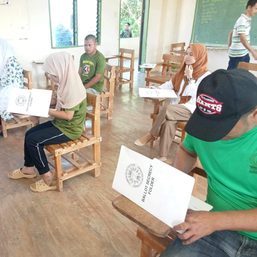SUMMARY
This is AI generated summarization, which may have errors. For context, always refer to the full article.
Amid a renewed push to revamp the Philippines’ electoral system, lawmakers at the House of Representatives vowed to carefully study proposals seeking to shift the country from automated to “hybrid” elections.
House committee on suffrage and electoral reforms chair Representative Juliet Ferrer of the 4th district of Negros Occidental made the commitment on Wednesday, January 27, saying Congress “cannot rush” deliberations on the proposed change eyed a year before the 2022 polls.
The Commission on Elections (Comelec) – already in the thick of preparations for the presidential election on May 2022 – earlier said that if Congress wanted to shift election systems by then a law would need to be passed by January 2021.
Comelec Commissioner Marlon Casquejo reiterated this on Wednesday, saying the poll body was already in the process of procuring items needed for the 2022 elections.
Still, Ferrer said: “We cannot rush it because it is a very important matter, very complex. So we cannot say that we will rush it just so that we can catch the deadline that Comelec was mentioning.”
Ferrer’s statement followed a brief discussion by lawmakers on several proposed bills that backed the implementation of a hybrid election system. Under a “hybrid election,” the Philippines is considering a manual process of voting and counting of ballots at the precinct level, and an automated process of transmitting and canvassing results.
Split views
During the House committee’s hearing, lawmakers in support of a hybrid election argued that employing such a system would address “doubts” in the current automated election system (AES). It would ensure all ballots were counted “beyond doubt.”
“We want the accuracy of 100%…. We need really this hybrid to eliminate doubts and to make sure the integrity of ballots cast at the precinct level,” said Samar 1st District Representative Edgar Mary Sarmiento, one of the authors of a proposed hybrid election bill.
Deputy Speaker Rufus Rodriguez and Lanao del Norte 1st District Representative Khalid Dimaporo, however, expressed opposition against switching to a hybrid system.
Rodriguez, who previously sat on the House of Representatives Electoral Tribunal, pointed out that in the over 40 electoral protests tackled during his term, “Not one of the cases filed on electoral fraud – meaning there was failure of the AES occurred – prospered.”
Rodriguez said this was due to the Philippines’ switch to an automated election that got rid of the infamous “dagdag-bawas” scheme. Prior to automation, Philippine elections were notorious for the “dagdag-bawas” or “add-subtract” scheme – shaving votes off the tally of a candidate and transferring them to another’s.
“When you give it to human intervention in the lower levels, that is where there is a problem. With due respect to my colleagues who I respect so much… I was in HRET, not one of the cases showed there was hanky-panky in the result and the sovereign will (of the people) was not reflected in the electronic precinct count. That is, what it is,” he said.
Dimaporo echoed this, describing a switch to hybrid elections as a “step back.” Rather than changing electoral system, he said efforts should be focused on addressing gaps seen in automated elections.
“The AES is much faster, much more expedient but not necessarily perfect. And it’s in its imperfections where we need to correct,” he said.
Responding to these position, Sarmiento said he would be amenable to keeping an automated election but that the Comelec should address issues raised during the 2019 elections.
Casquejo said the Comelec was already studying the implementation of additional security measures that would increase transparency in the upcoming nationwide polls. These incldiued the inclusion of the transmission of voters receipts and allowing digital signatures of electoral boards to be used.
Election lawyer Emil Marañon III, who was former chief of staff of the late Comelec chair Sixto Brillantes Jr, warned that switching to a hybrid system would make elections costlier, more time consuming, and error-prone. – Rappler.com
Add a comment
How does this make you feel?





There are no comments yet. Add your comment to start the conversation.